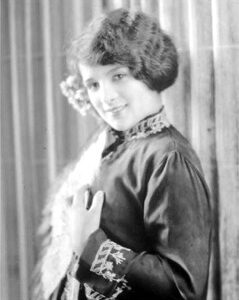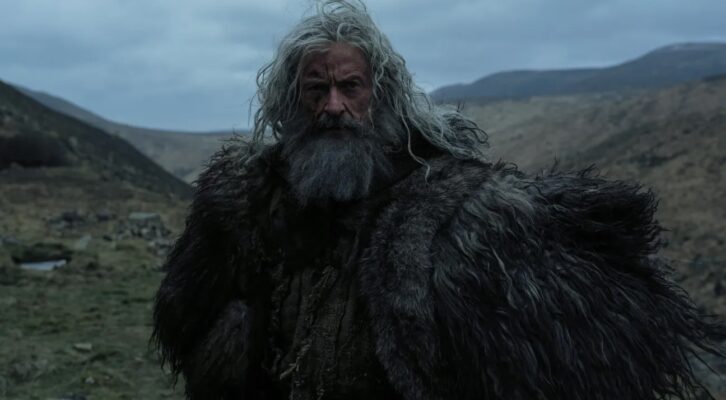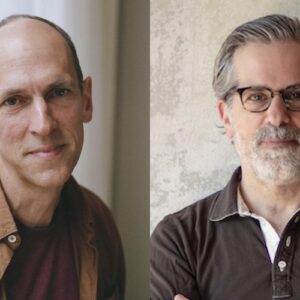
On Girls, Trump, and Everyone I Ever Dated Before My Husband
Elizabeth Crane's Brief History of Men Explaining Things to Her
I’m going to say H. was the first in the long-running series. I was in a senior in college, if we can use the term “senior” to mean ninth semester. We met at brunch in an Upper East Side café that served all-you-can-drink mimosas (praise god) when I was home in the city for a weekend. My girlfriend—a young actress already making her way in the world, someone I admired greatly on just about every count, the main one being her obvious sense of self-worth, had brought two young men with her; picture some New Yorker cartoon where one of the guys has angel wings and the other, devil horns. I don’t know what the joke is, but Angel Wings is the less attractive one (of course), and Devil Horns is maybe not more attractive by leaps and bounds but it doesn’t matter. He wore wire-rimmed glasses and he was funny (criteria #3) smart (criteria #2) and he looked at me (criteria #1). Both of them paid me much attention, but Devil Horns was the one who got my number in the end. Angel Wings was in banking. He never had a chance. Devil Horns was a composer. Irritated as I was as soon as he said it, when the conversation turned to ballet, he probably had me at “Balanchine is a choreographer.”
Devil Horns and I endured for a few months of sex and mansplaining until we both reached peak pretending it was ever going to be more than it was. I lasted just a few months with Devil Horns, until the proximity to his intellect no longer outweighed the increasingly less subtle insults to my own intelligence. When I asked where he thought we were, he said he didn’t see it going past where it was because I’d never be as smart as he was. I don’t remember what my exact response was, but it was pretty close to “Okay, bye then,” before I hung up the phone.
I could give you plenty more details here, but there’s a short story, and there are other short stories, and one of the through-lines is that every time I met one of these guys over the next a whole lot of years, the warning signs were always very clear from the beginning (under: “Balanchine is a choreographer” see also, “What a menorah is”). I took great pride in my observational skills, and I took great (false) pride in being able to steer away from the physically or verbally abusive ones (um, mostly). Yet in pretty much every case, I plowed ahead with two primary thoughts in mind: low expectations for anything long-term mixed with small, vague hopes that one of these guys would somehow be different. A hint of they will see that I am their equal! ultimately overpowered by woody, masculine notes.
“I always felt willing to stand up for myself to the extent that I’ll call out an insult when I see it.”
I drove from LA to Boca Raton with one of these guys, in a Honda that had cost him 40 bucks. We’d been dating, ish, long-distance, for however much time two months of that sort of dating adds up to when he invited me to meet him in LA on a Sunday and I flew there on a Monday. I wrote my first novel based on that disastrous road trip, which thankfully remains unpublished, and one of the rejections that came in basically said that my writing was funny and sharp but that in the end they couldn’t understand why this bright woman would be with this guy. Not to get too far off track, but I knew from a literary standpoint that I hadn’t done my job, though I’m not sure I would even have been capable at the time. I knew going in that I had made a poor choice with that guy, but I’m not sure I’ve ever understood the true depths of why I made that same kind of choice again and again. I always had this idea that if you put every guy I ever dated with real interest into one room, you’d be hard pressed to guess what the connecting thread was. There wasn’t an obvious physical type, beyond mostly white, though you could for sure argue that that’s relevant. It’s a factor.
I have been to therapy. A bunch. Just saying.
My mom is long gone, but her best friend, now past 80, said to me not long ago, “You never really finish trying to figure it out.”
I am old enough to be Hannah Horvath’s mother. I am no one’s mother, but the point is, I am from a different generation, and there are any number of ways in which younger generations differ from mine, though it probably comes down to specifics.
In the broadest sense, one of the reasons I’ve been compelled by Girls is that I’ve never forgotten how much my twenties sucked. Hannah and her friends may seem like extreme personalities, but it’s easy to connect with their bungles and missteps. Most of the choices I made in my twenties in career and romance were made from a list of possible reasons: as backlash against a previous bungle, as backlash against what I thought I was expected to do, as backlash against the results of the last bad decision, and later, from sheer exhaustion. I truly thought I would somehow land in a literary version of Lana Turner at the soda fountain (which itself didn’t even happen): that I’d be sitting on a barstool and the right person would walk in and my genius would simply be perceptible on sight. I ended up in a miserable office job at a talent agency, dating a verbally abusive, post-peak actor. Charming would be a stretch. I guess he had a twinkle in his eye, I could maybe give him that. Better than nothing was my sole criteria for dating him, until nothing actually turned out to be way better.
I am hoping someone will come up with a more satisfying word than “trigger” soon to describe what happens when one thing reminds someone unhappily of something else. But for now I’ll just say that the national trigger that is Donald Trump has everything to do with why an episode of Girls like American Bitch resonates so deeply (stop what you’re doing and watch it now if you haven’t already seen it—it works well as a standalone even if you’re not a fan). At the Donald Trump level, it’s hard for me to put myself in the shoes of a Melania or any wife who went before. I’m not interested in living in a gilded tower, and I can’t imagine a specimen of human for whom I would want to take on a lifestyle in which I imagine I would be deeply uncomfortable at every turn, much less one who seems to have less than zero respect for women. I HAVE GIVEN THIS SOME THOUGHT. What if the nicest guy ever had come along and he happened to be super wealthy and we lived in some Upper East Side penthouse and went to black tie fundraisers every other night? It’s hard to imagine me remaining me under those circumstances. I wouldn’t punish a fancy face cream or a giant bathtub for coming into my house. But the only dealbreaker I thought I ever really had besides physical abuse was smoking, and when I finally fell in love, I broke it. Which is to say it’s possible. But it didn’t happen, and now I have digressed.
The Access Hollywood tape in which Trump (his comrade Billy Bush here, less disgusting here only by degrees of “not an alleged rapist”) says any number of offensive things before he describes what in the end is an endorsement of physical assault, had me physically shaking. I have never been grabbed by the pussy. But what it shook out of me were some next-level insights about my personal history. I tried to make a list of all the offenses I’d endured from the men I’d: dated, known, been related to, met, worked with, worked for, walked by on the street, read books by, and so on. I began this inventory when I was around age six and witnessed a man jerking off between subway cars, which my mom fumbled to explain, and in the subcategory of “men jerking off in public,” I knew I’d lost count of that decades ago. I soon realized I’d probably never remember everything.
More often though, in my case, many of these offenses were seemingly subtle enough as to not initially appear offensive at all. Plus, I was going into adulthood with this handed-down idea that a great deal of this was to be expected and tolerated as “just the way it was.” Locker room shit. Shit you breeze past time and again until one day you’re almost 30 and you’re on speaker phone just bullshitting with two guy friends and one asks what you’re wearing and you’re not sure if it’s just a bad joke but suddenly you’re profoundly uncomfortable and it seems like you should know exactly why but you don’t, all you know is that you need to get off the phone and go pour yourself a big drink. And then it’s 2017 and that phone call was over 20 years ago and there’s Hannah Horvath in the fancy writer’s apartment and he could be everyone I ever dated before 1993 and a couple more after that, just to be sure. Worth noting that they were mostly not writers. Sometimes they were “writers.” The devil is in the brilliant details of this episode, and what struck me was that when you took away the specifics, the power differential and the dynamic between the woman and the man here hit alarmingly close to home.
“I had an impulse, a very strong one, to get out of the guy’s car on the way to the movies.”
I have showed up, willingly, for these liasons that were so often set up in ways that benefitted the man: if it was in some way on their turf or their schedule, we’ve already begun on an uneven footing, whether we realize it or not. I have told myself, time and again, that my power was in making the choice to show up or not, but if it were that simple, if I had the confidence of my actress girlfriend, I might have chosen not to show up at all. And that I had not made that better choice, often, had a tendency to linger in my mind in perpetuity and to expand far beyond reasonable proportion. I blamed myself. I always felt willing to stand up for myself to the extent that I’ll call out an insult when I see it. But there’s a category of men whose greatest talent, above and beyond awards, is to cloak their insults in compliments (probably yet another subcategory of my aforementioned inventory), so that even if you have a feeling somewhere in your body about it at the moment someone says something along the lines of “You’re my favorite female writer,” or “You’re so much smarter than this,” I’m inclined to hear Smart! and Favorite! first while the negatives in these sentences burrow into the background until some good time after I’m all in. Hannah challenges the famous writer dude, as I always did as well. The writer makes his points and she makes hers, and when he asks her to explain what she thinks is in it for these women, there was one line in particular that got me: “It’s not so she has a story. It’s so she feels like she exists.”
It is very heady stuff, when you’re 22 and 25 and 28 and an older, attractive, smart, successful man pays you mind, and feeds you just enough compliments to make you feel you may have a place in the world, one that might even include a place with him. This would be plenty heady enough, but as often as not, each compliment (genuine or not, may not really matter) comes with a subtraction, a parallel comment or insult often sufficiently cloaked so as to undermine your entire sense of self, if not immediately, soon enough.
And I did get more than a few short stories out of these guys, most of whom I met long before I had a notion to write short stories at all. I wasn’t meeting a lot of writers back then, but that’s neither here nor there. Many of them were one kind of artist or another. And yet considering those stories today, I wonder if I’d write them the same way now. I was more interested in the specifics of character then—look at the exact crazy way this guy is a jerk!—than I was in the way that the dynamic, especially over the long haul, worked so insidiously to undermine my sense of self.
Further complicating these relationships: these men present themselves as honest, yet they will calculate what it is you need to hear to carry on for as long as it might suit them. In my relationship history, this honesty often came in the form of someone telling me very openly from the get go that he wasn’t available, emotionally or otherwise, but the definition of available would usually become murky after those first few weeks of soulful all-night conversations and/or nightly sleepovers and/or ongoing series of emails in which I felt truly understood in spite of trying to remind myself daily that I had agreed to the terms, even though what I ultimately sought was commitment.
Some of the stuff that seems gray is maybe not gray at all, but is made gray when we tolerate it, or at least that’s my experience. We think we’re not tolerating it because we’re speaking our minds, but we’re there until we’re not. I could see these guys for what they were, and I took a ridiculous sort of pride in this, but I made those choices to go forward with my free will. But after a lifetime of absorbing hostile messages, subtle or less so, even a lifetime as short as 25 years, free will itself becomes a little gray. It’s low-grade Stockholm Syndrome.
A significant part of my own deal is that for so long I just never really knew how smart I was. I always believed myself to have a certain type of city smarts, people smarts, but I wasn’t a great student, and for various reasons it didn’t occur to me that I could be a better one. That my parents had been straight-A students with multiple graduate degrees between them was relevant only to highlight what an intellectual failure I was. And so if I was paid mind by people I considered smart, I was less likely to think it mirrored my own intelligence in any way than I was to question why they were even hanging around me. The scraps of fuel for my self-esteem I’d get from these relationships was a sine wave of maybe I am bright peaks and I’m such an idiot valleys. It may be illuminating that when I got my first agent, my stepfather congratulated me, hung up, and called me back the next day to let me know he’d made some calls and learned that I’d chosen well. When I got my first book deal, his response was, “That’s wonderful, sweetheart, now listen, you need to fix yourself up a little.” That his style and agenting advice would not have been welcome upon hearing the best news that had ever happened to me even had he been in the literary field, was neither here nor there to him. He knew best.
Much later, when the subject of whether or not he’d read any of my work came up, he’d make comments like “It’s not for me,” and when invited to a reading, declined by saying, “I heard you read when you were a kid.” My real father had throughout my entire life, been encouraging and supportive of my desire to be a writer, admiring of my talent and always doing what he could to help, sending typewriter ribbons and Chicago Manuals and such over the years, necessary tools. When I was in my twenties, he even tried to get me to apply to the Iowa Writers Workshop (admittedly, this would have meant three years where I’d have lived in his city, so it wasn’t without a small plus for him), but at that time, my confidence allowed me to let about two people read my work, in no small part because for every positive message I got from Dad, the original Angel Wings, I got a Don’t bother from Step-Devil Horns back east. Everything was in place, well before my fateful east side brunch, for me to find myself in this kind of dynamic again and again and not have any idea why I let it go on as long as I did. There’s an insidiousness to it that makes it hard to see what might be obvious to anyone looking on. Even my girlfriend told Devil Horns that day, “I’m pretty sure she knows who Balanchine is.”
On one of the last first dates I ever went on (a writer! sexy! flirty! younger! maybe different! but so obviously not!), I had an impulse, a very strong one, to get out of the guy’s car on the way to the movies. To literally ask him to stop the car and let me out. I don’t think he’d even said anything particularly offensive at this point. It may have just been the way he was talking so very much about himself. In any case, I ignored this impulse, went to the movie, slept with him, and afterward, felt like I might be physically sick. I make no judgments about what people do sexually by consent, and this was fully consensual, and nothing unusual, except for how I felt afterward. Like I had once again, and at this late date in my life, made a horrible choice, except this time it was kind of like when I eat a Quarter Pounder—my body felt gross about as soon as I’d eaten the last bite.
I made a new choice that same day. I was not going to sleep with anyone again until I was in love. Until I was in love. Not until I thought someone was mildly interested in me, or even until someone was actually in love with me (which, not for nothing, hadn’t really happened by then). Until I was in love. And I made this choice with almost no confidence that it would ever actually happen. In some ways it may have been resignation as much as anything. I was done with this kind of guy. It was something of a relief. And I was willing, at that point, to remain alone, if a true partnership didn’t happen to come along. That said, five years later and still single, I was fairly close to modifying my own ultimatum to something more like, “on or until I’m horny or lonely enough to change my mind.” I realized that there might come a point where I was lonelier, or lonely in a new way, that might motivate me to modify my original plan. You make a plan like this and there’s no way to know if you’ll meet someone who’s right for you. I always hated when friends would say “Oh of course you’ll meet someone!” because there’s just no way of knowing that, and it sounds nice, but I’d rather just plan for a fulfilling single life than have my hopes crushed any more times than they already had been.
Before my husband, two men in my life had told me they loved me. The first was when I was 19, and I am so sure that dear young man really did love me, but I was super not ready for any of that. The second, a dozen years later, was very obviously lying, to the point where I could imagine him putting me on hold to tell some woman on the other line he loved her too. A couple of other times, I tried out saying these words myself, in part as a matter of agency. I felt something for each of those two men that felt like love, and I more or less knew this was unreturned, but in doing so I imagined I was gaining some small bit of desperately needed power by not waiting, if in the most vulnerable possible way. These were small victories, made still smaller when the response in both cases was a tepid and deflating “I love you too, in my own way.”
I had a long-held theory that a good relationship didn’t have to be as hard as it always had been, that kindness plus compatibility plus wanting to have sex with someone could maybe possibly somehow be, what love was. It was what I wanted it to be, anyway. When Ben came along, my theory gained some traction. My first book had recently come out, to some small bit of hooplah, and when we started dating I remember thinking, I can’t believe this guy is up for this, and thinks it’s cool, and has no interest in diminishing my success in any way. (Say what you want about that, but the guys in that long-running series before him took their toll on my hopes for something resembling an equal partner.) So when Ben told me he loved me, fairly early on, I thought, Oh yeah. Me too, and I said it back, it wasn’t dangerous and it wasn’t scary and it wasn’t unbalanced. It was what love was.
Elizabeth Crane
Elizabeth Crane is the author of the novels The History of Great Things and We Only Know So Much and four collections of short stories, including Turf, which will be released in June 2017. Her stories have been featured on NPR's Selected Shorts. She is a recipient of the Chicago Public Library 21st Century Award, and her work has been adapted for the stage by Chicago's Steppenwolf Theatre Company. She currently lives in Newburgh, New York.



















